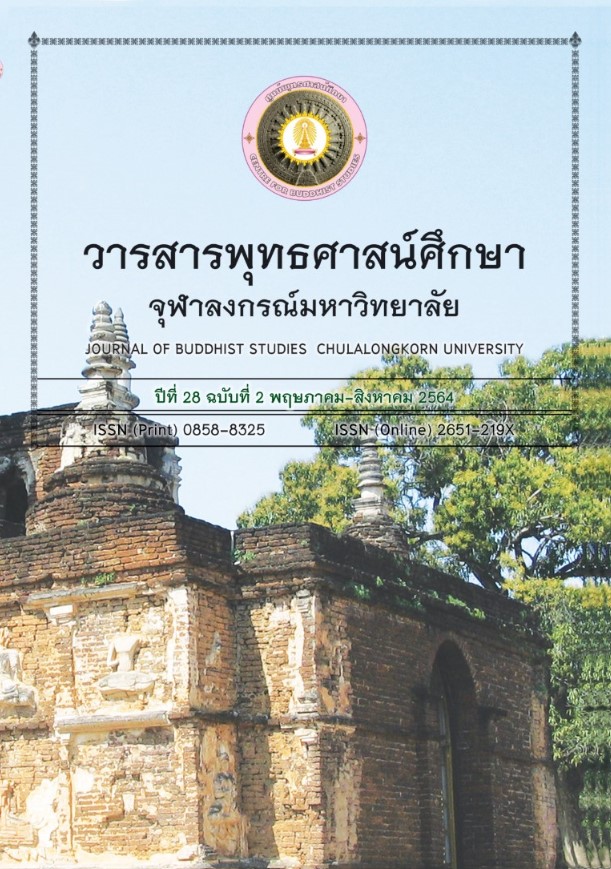Buddhist Pluralism and the Concept of God
Keywords:
Buddhism, religious pluralism, God, Brahmanism, Caste system, SacrificeAbstract
This research aims to study the attitude of Buddhism within the conceptual framework of religious pluralism towards the concept of God in the Tipitaka by focusing on the analysis of narratives concerning the confrontation between Buddhism and Brahmins’ concept of God in the Tripitaka. The study finds that the Brahmins’ concept of God in the Tripitaka is that of a monotheistic God. The Buddhist doctrines cannot accept the Brahmins’ concept of God, but it does not appear to be a straightforward rejection of it. Words of the Buddha in the Tripitaka merely point out that no person has ever been able to examine the concept of God through the senses. As for the caste system and sacrifice, these Brahmin doctrines are directly related to the concept of God. Buddhism does not overturn the doctrines of caste system and sacrifice, but deconstructs them by converting from divine system of classes and rituals to ethical actions as well as natural and political processes. Nevertheless, the attitude of Buddhism towards Brahmins’ concept of God is not sufficient for affirming that Buddhism does not have a religious pluralist outlook because Buddhism maintains that the ultimate truth is objective, thereby opening up possibilities for other religions to discover it. However, Buddhism does not accept that the teachings of all religions are all equally true.
Downloads
References
ชาญณรงค์ บุญหนุน. พุทธจริยาและภาวะผู้นําการเปลี่ยนแปลงของพระพุทธเจ้า: ศึกษาจากเรื่องเล่าในพระไตรปิฎกและอรรถกถา. (เอกสารอัดสําเนา)
ชาญวิทย์ ทัดแก้ว. ทัศนะของพระพุทธเจ้าต่อระบบวรรณะ. วารสารอักษรศาสตร์ จุฬาลงกรณ์มหาวิทยาลัย, 28, ฉ.พิเศษ (2542): 108-119.
โชศี, ลาลมณี. (2542). พราหมณ์ พุทธ ฮินดู. กรุณา กุศลาสัย แปล. กรุงเทพฯ: แม่คําผาง.
พุทธทาสภิกขุ. (2528). ใจความแห่งคริสตธรรมเท่าที่ชาวพุทธควรรู้, หนังสือชุด ธรรมโฆษหมวดที่ 5. กรุงเทพฯ: ธรรมทานมูลนิธิ.
พระพรหมคุณาภรณ์. (2552). พุทธธรรม (พิมพ์ครั้งที่ 11). กรุงเทพฯ: มหาจุฬาลงกรณ์ ราชวิทยาลัย.
มหาจุฬาลงกรณราชวิทยาลัย. (2539). พระไตรปิฎกภาษาไทย ฉบับมหาจุฬาลงกรณราชวิทยาลัย. กรุงเทพฯ: มหาจุฬาลงกรณราชวิทยาลัย.
วิจิตร เกิดวิสิษฐ์. (2528). รายงานผลการวิจัยเรื่อง ปรัชญานอกพระพุทธศาสนา ตามที่ปรากฏในพระไตรปิฎก. คณะอักษรศาสตร์ จุฬาลงกรณ์มหาวิทยาลัย.
สุนทร ณ รังษี. (2545). ปรัชญาอินเดีย: ประวัติและลัทธิ. กรุงเทพฯ: สํานักพิมพ์ แห่จุฬาลงกรณ์มหาวิทยาลัย.
สุมาลี มหณรงค์ชัย. (2546). ฮินดู-พุทธ จุดยืนที่แตกต่าง. กรุงเทพฯ: สุขภาพใจ.
สุวรรณา สถาอานันท์. (2550). ศรัทธากับปัญญา: บทสนทนาทางปรัชญาว่าด้วย ศาสนา (พิมพ์ครั้งที่ 2). กรุงเทพฯ: สํานักพิมพ์แห่งจุฬาลงกรณ์มหาวิทยาลัย.
สแวเรอร์, โดนัลด์ เค. (2547). ศาสนาไร้พรหมแดน. กรุงเทพฯ: สวนเงินมีมา.
Jayatilleke, K.N. (1991). The Buddhist attitude to other religions. Kandy: Buddhist Publication Society. Kiblinger,
Kristin Beise. (2004). Using Three-Vehicle Theory to Improve Buddhist Inclusivism. Buddhist-Christian Studies, 24(January), 159-169.
Robinson, Richard H. Johnson, Willard L. and Thanissaro Bhikkhu. (2005). The Buddhist religion: a historical introduction (5th Edition). U.S.A.: Wadsworth, a division of Thomson Learning.
Schmidt-Leukel, Perry. (2017). Religious pluralism & interreligious theology: the Grifford lectures-an extended edition. New York: Orbis Book.
Sharma, Arvind. (1997). The philosophy of religion: a Buddhist perspective (2nd Edition). New Delhi: Oxford University Press.
Downloads
Published
How to Cite
Issue
Section
License
บทความที่ได้รับการตีพิมพ์เป็นลิขสิทธิ์ของศูนย์พุทธศาสน์ จุฬาลงกรณ์มหาวิทยาลัย
ข้อความที่ปรากฏในบทความแต่ละเรื่องในวารสารวิชาการเล่มนี้เป็นความคิดเห็นส่วนตัวของผู้เขียนแต่ละท่านไม่เกี่ยวข้องกับศูนย์พุทธศาสน์ จุฬาลงกรณ์มหาวิทยาลัย และคณาจารย์ท่านอื่นๆในมหาวิทยาลัยฯ แต่อย่างใด ความรับผิดชอบองค์ประกอบทั้งหมดของบทความแต่ละเรื่องเป็นของผู้เขียนแต่ละท่าน หากมีความผิดพลาดใดๆ ผู้เขียนแต่ละท่านจะรับผิดชอบบทความของตนเองแต่ผู้เดียว






